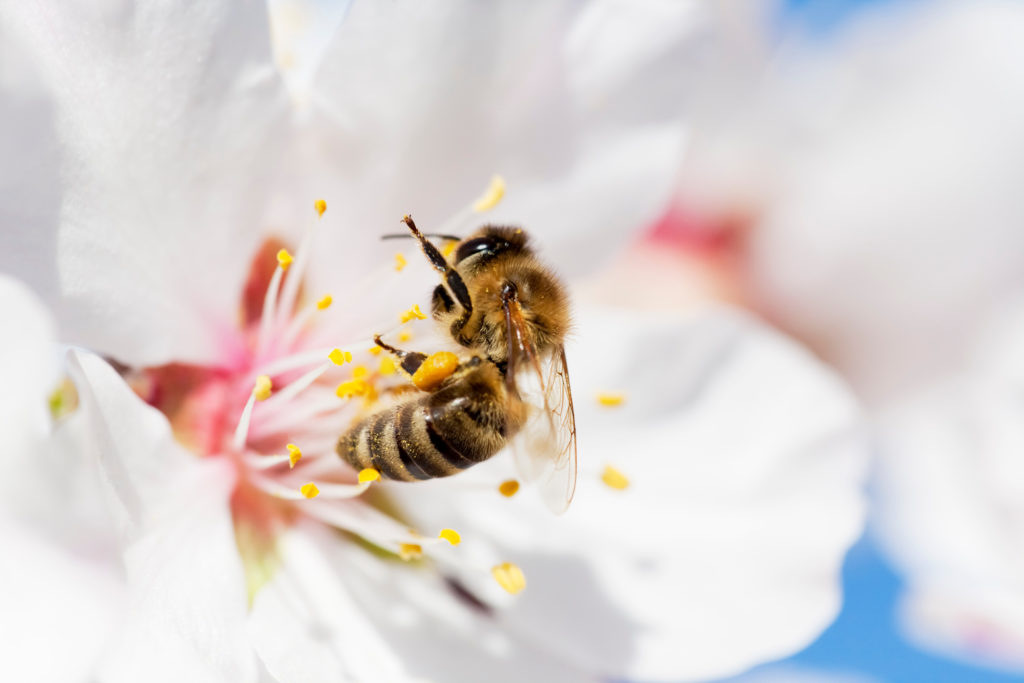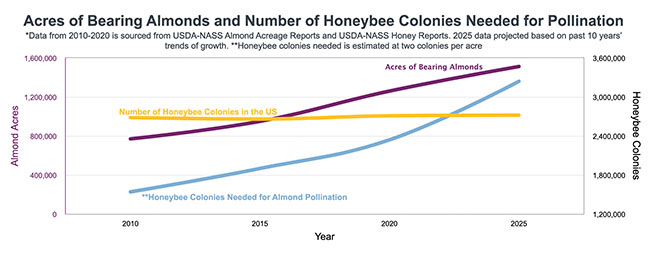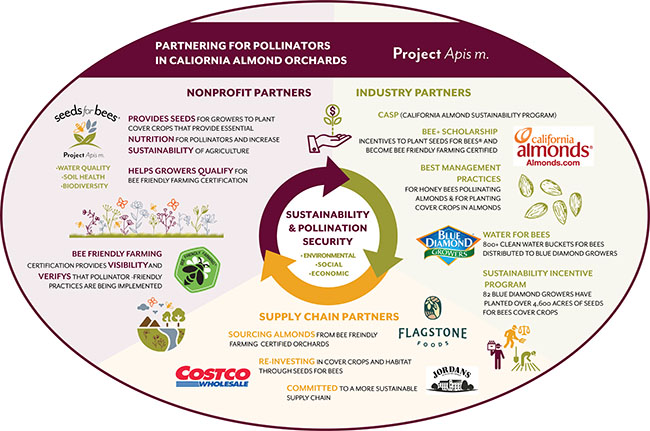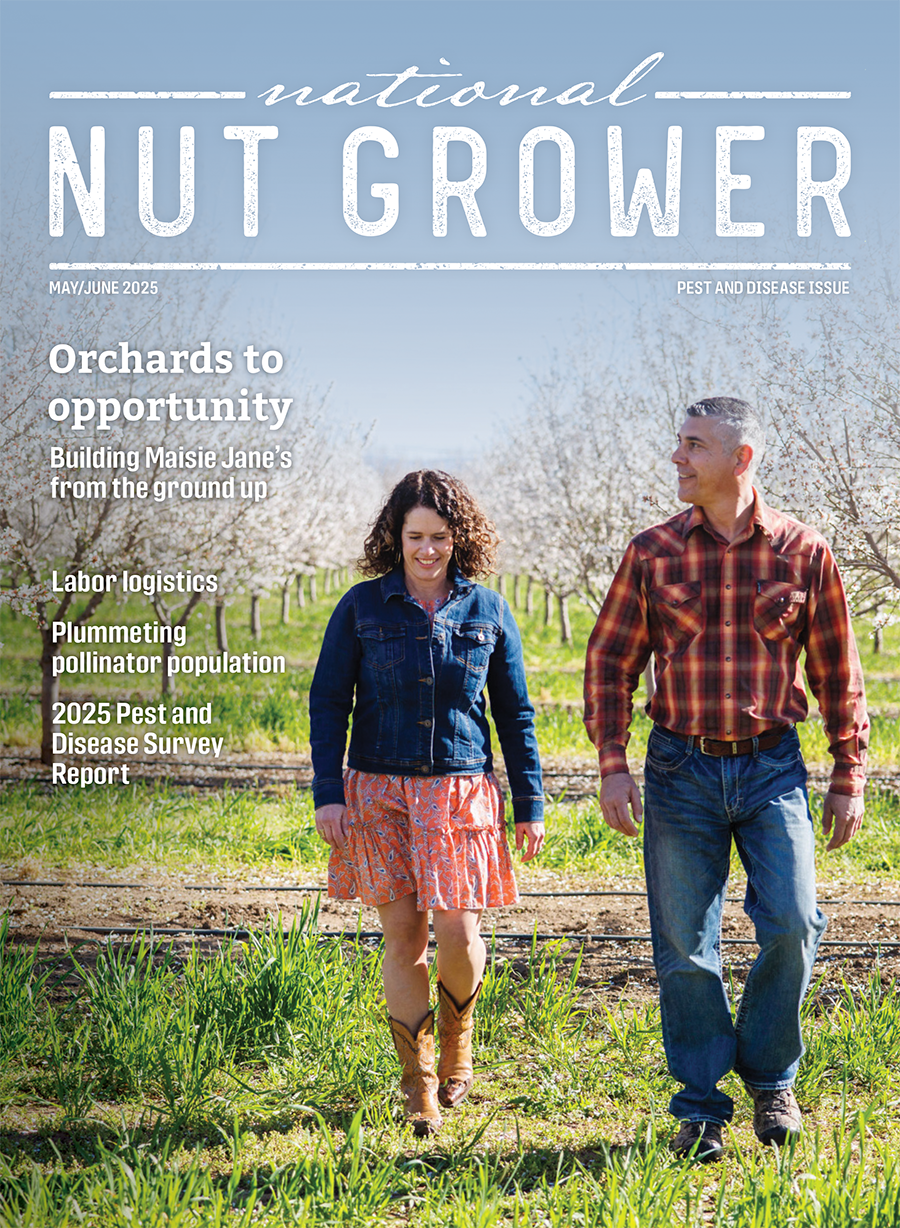
Fall 2021
It takes a village

The recent issues facing agriculture in the West have increased the challenges that farmers and growers must overcome in order to produce high-quality food and fiber. Extended periods of drought, wildfires and climate change – combined with high annual mortality rates of honeybees, pollinator declines, and increasing consumer awareness and demands – have pressured growers to adapt.
Pollination security is a part of sustainability. Almonds, along with many other crops, rely on insect pollination, and keeping pollinators healthy is important to agriculture and our food supply. The acres of almonds in need of pollination next February are forecasted at an all-time high and continue to increase, while honeybee populations have remained relatively stable (rebuilding from high annual losses every year) over the past decade. It is estimated that 88% of all honeybee colonies in the U.S. will be needed to pollinate the 2022 almond bloom, leaving little room for any unexpected crisis[1,2].
Although honeybees aren’t at risk of becoming “extinct,” the commercial beekeepers who provide pollination services are becoming more scarce[3] due to the increasing parasite and pesticide pressure, habitat loss, low honey prices, and climate change among other challenges. In 2005, colony collapse disorder hit the beekeeping community hard – if a similar challenge were to occur today, an even bigger crisis would result, as the margin of supply (honeybees) and demand for pollination has narrowed.
Along with the challenges that beekeepers face, an estimated 50% of native bees are experiencing population decline, along with many other native pollinators including the rapidly disappearing Western monarch butterfly which overwinters in California.

Key partnerships between industry groups, nonprofits and retailers are helping reinvent a more sustainable almond supply chain that supports pollinator health. Organizations like Project Apis m., the Almond Board of California, Blue Diamond Growers, Costco, Flagstone Foods and Pollinator Partnership are increasing engagement to provide solutions that benefit pollinators, growers and consumers.
At the heart of these partnerships, practices like planting cover crops, hedgerows and habitat play an important role. Integration of these practices can result in better water use efficiency, decreased reliance on synthetic fertilizers and pesticides, decreased atmospheric carbon, and increased pollinator and soil health. The Seeds for Bees program reduces barriers to growers planting cover crops, offering free and subsidized seeds and technical advice. Pollinator Partnership’s Bee Friendly Farming certification provides a pathway for growers, suppliers and retailers to communicate to the public that the food they eat has been produced in a way that is better for pollinators and more sustainable.
The Almond Board of California and Blue Diamond Growers work with Project Apis m. and Pollinator Partnership to make blooming cover crop seeds and Bee Friendly Farming certification even more accessible to growers. The Almond Board of California’s California Almond Sustainability Program and Bee+ Scholarship, and Blue Diamond Growers’ Water for Bees and Sustainability Incentive Programs are excellent examples of industry-leading organizations making a direct impact on the way growers manage their almond orchards. In addition to incentivizing management practices that support pollination security and sustainable farming, these organizations help educate growers about how to apply these practices in their own farms and orchards.

Retailers and processors are also taking steps to meet consumer demands and bring more sustainable products into the supply chain. Costco Wholesale has been a long-time supporter of Seeds for Bees and honeybee research, and Jordans Cereals also supports a healthier supply chain for pollinators through Seeds for Bees. Most recently, Flagstone Foods, a private label manufacturer of snack nuts, trail mixes and other snacks, announced their commitment to promoting a more sustainable almond industry by sourcing 100% of its almonds from Bee Friendly Farming certified producers by 2025, and by supporting Seeds for Bees to help growers meet the certification criteria. Sourcing pledges like the one made by Flagstone Foods tie a thread from management decisions made on the farm to the tables of the discerning consumer.
If you are a farmer or grower in California and would like to be a part of the movement toward sustainability and pollination security, the 2021-2022 Seeds for Bees open enrollment period is happening now. Interested applicants are encouraged to apply by going to the Project Apis m. Seeds for Bees website. Growers of all types can apply, and first year applicants are awarded up to $2,000 of free seed. More information about the Pollinator Partnership’s certification and the criteria for Bee Friendly Farming can be found on its website.
References:
1. Almond Board of California. 2020 Almond Almanac. Pg. 32
2. National Agricultural Statistics Service (NASS), Agricultural Statistics Board, United States Department of Agriculture (USDA). Honey Bee Colonies (August 2020)
3. Special tabulation request from the 2017 NASS Census









